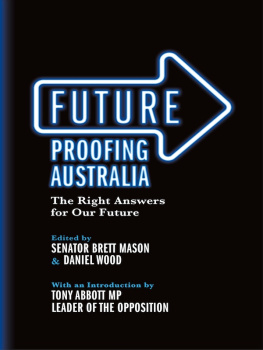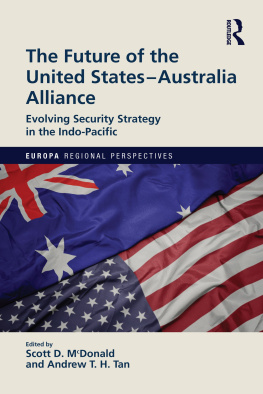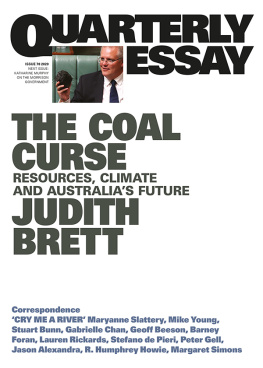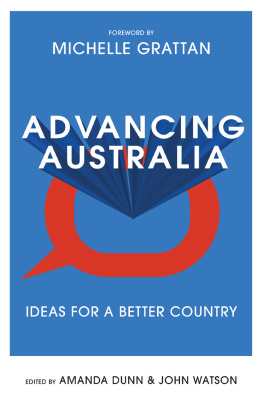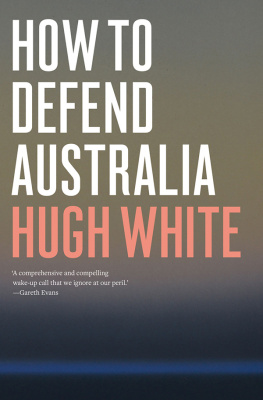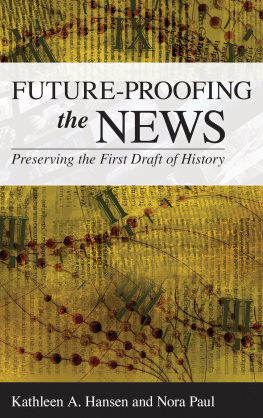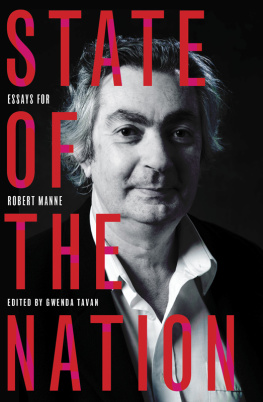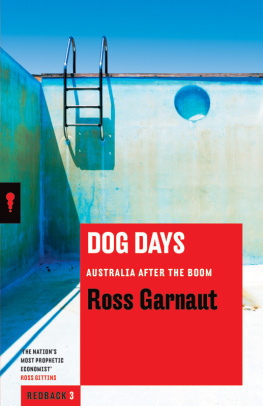
Senator Brett Mason is the shadow Minister for Universities and Research and a Liberal National Party senator for Queensland. Educated at the ANU, Cambridge and Griffith universities, he holds a doctorate in legal theory. Before entering Parliament in 1999, Brett lectured in criminology at QUT and served as a Commonwealth prosecutor. He is the author of Privacy Without Principle: The uses and abuses of privacy law in Australia .
Daniel Wood is a senior policy adviser to the Queensland Minister for Science, IT, Innovation and the Arts, and is the Chief Executive Officer of the Sir Paul Hasluck Foundation. He has previously worked as a prosecutor, political adviser to the Queensland Leader of the Opposition and as an adviser to a member of the Federal Shadow Ministry.
Contents
Preface
As the French writer Pierre Dac once wrote, The future is the past in preparation. For the purposes of this collection, one could say that future proofing is the past with sound preparation.
All contributors to Future Proofing Australia are motivated by a desire to see Australia confront and overcome significant challenges facing our country, so that future generations continue to enjoy the prosperity, opportunity and lifestyle that are much envied around the world.
The contributors also understand that ideas matter. New, fresh ideas are the lifeblood of any successful society. Without those ideas, societies stagnate and then witherunable to either confront or resolve problems facing them.
This book was conceived to assist that blood flow. It is not designed to be comprehensive; there are many important issues not included in these pages. But for those that are, it is designed to inform, challenge and lift the level of public debate.
We have set out to assemble some of Australias great thinkers and doers to boldly confront the future and map out a path for our country. The response has been humbling as well as deeply enlightening. A cardinal, a Nobel laureate, a former head of the Australian Defence Force, Australias leading demographer and former ministers from three different political parties have all contributed their time and their ideas. Despite, or maybe because of this, this book is not meant to be a political manifesto or a party policy platform. Indeed, there is no ideological or partisan thread that links all the contributors, except their wish to engage in constructive debate for the betterment of our nation.
You might find yourself nodding along with some contributors and violently disagreeing with others. Not all good ideas are popular and not every offered solution will receive broad support. But as Oliver Wendell Holmes, Jr. said, The best test of truth is the power of the thought to get itself accepted in the competition of the market.
Coming, as we both are, from a pro-market philosophical tradition, we hope this collection will be a useful contribution to Australias marketplace of ideas. Each essay is sure to provoke some discussion. And, after all, we have to ask the right questions before we can seek the right solutions.
Senator Brett Mason and Daniel Wood
February 2013
Introduction
The Hon. Tony Abbott MHR
I congratulate Senator Brett Mason, Daniel Wood and MUP for assembling and publishing this collection of essays. It brings together big thinkers on big issues.
Each one of these essays is worth reading. Whether its General Peter Cosgrove on Australias future military forces, Cardinal George Pell on the role of Christianity in shaping our society, Professor Greg Craven on the merits of competitive federalism or Bernard Salt on what our country might look like forty years hence, these essays are well informed, thoughtful and often persuasive.
These essays are the opposite of the ideological. None starts with an all-embracing idea and attempts to make the world conform to a theory. Each starts with facts and tries to tease out their implications. Still, implicit in each of them are certain values and instincts: respect for the dignity of each individual, an appreciation of the duties that citizens owe the state and each other, and a preference for freedom. Liberal conservatism is not a systematic philosophy. Its pragmatism based on values.
The challenge, of course, for a liberal conservative political movement is to translate the analyses in these essays and elsewhere into a program for government.
I hope that the legacy of the next Coalition government will be lower taxes, better services, stronger borders and modern infrastructure. Our country needs change for the better, much of which will be restoration rather than reform. Australians arent looking for a new, official vision of what our country should be and what people should do. Instead, they want common sense government that fosters peoples ability to make their own choices and to realise more of their own dreams.
Tax reform starts with abolishing the carbon tax and the mining tax. The carbon tax will hurt families cost of living and make every job less secure without actually reducing emissionswhich will increase by 8 per cent by 2020, not decrease, according to the governments own modelling. The mining tax penalises the sector that has kept us prosperous through the global financial crisis and sends a message to the world that the Australian government envies success.
Public hospitals run by community boards and public schools where parents, principals and school communities have greater say in how their schools are run should get more value from existing funding and attract more resources into the services that people most want.
Offshore processing of illegal boat arrivals at Nauru, temporary protection visas to deny people smugglers a product to sell and the option of turning boats around where its safe to do so are the best ways to secure our borders. These policies worked before under John Howard and can work again if implemented by a government that has its heart in them.
The next Coalition government wont spend $50 billion of borrowed money on a nationalised telecommunications infrastructure monopoly when the private sector could deliver fast broadband at a more affordable price using a range of technologies. Instead, the next Coalition government will deliver affordable, fast broadband more quickly, as well as deliver the road infrastructure that our big cities so badly need, such as Melbournes East West Link and Sydneys M4 East.
Sensible political parties and successful governments listen to the people who have thought deeply about our country and its problems and who have reasonable steps forward to propose. Good government requires a respectful hearing for an intelligent national conversation.
These essays are a tonic to uncertainty and disillusionment with government because they radiate hope and confidence in Australia and its people. Theyre not Coalition policy, of course; or even, necessarily, official Coalition thinking. All of them, though, in their own ways, are appeals for a government that inspires us more and disappoints us less.
The Hon. Tony Abbott MHR has been the Leader of the Opposition since 2009.
Part I: Society
Education for moral understanding
Dr Kevin Donnelly
The deepest currents of history are spiritual and cultural, rather than political and economic () History is driven () by what men and women honor, cherish, and worship; by what societies deem to be true and good and noble () by what individuals and societies are willing to stake their lives on.

